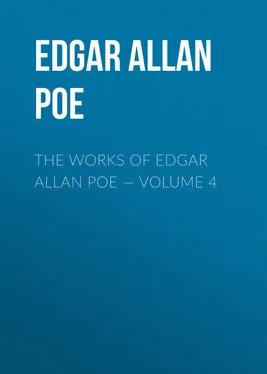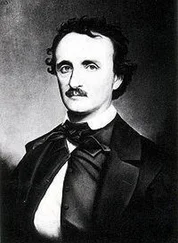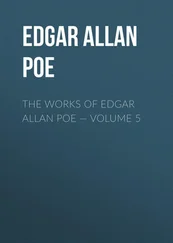Edgar Poe - The Works of Edgar Allan Poe — Volume 4
Здесь есть возможность читать онлайн «Edgar Poe - The Works of Edgar Allan Poe — Volume 4» — ознакомительный отрывок электронной книги совершенно бесплатно, а после прочтения отрывка купить полную версию. В некоторых случаях можно слушать аудио, скачать через торрент в формате fb2 и присутствует краткое содержание. Жанр: literature_19, foreign_antique, foreign_prose, на английском языке. Описание произведения, (предисловие) а так же отзывы посетителей доступны на портале библиотеки ЛибКат.
- Название:The Works of Edgar Allan Poe — Volume 4
- Автор:
- Жанр:
- Год:неизвестен
- ISBN:нет данных
- Рейтинг книги:3 / 5. Голосов: 1
-
Избранное:Добавить в избранное
- Отзывы:
-
Ваша оценка:
- 60
- 1
- 2
- 3
- 4
- 5
The Works of Edgar Allan Poe — Volume 4: краткое содержание, описание и аннотация
Предлагаем к чтению аннотацию, описание, краткое содержание или предисловие (зависит от того, что написал сам автор книги «The Works of Edgar Allan Poe — Volume 4»). Если вы не нашли необходимую информацию о книге — напишите в комментариях, мы постараемся отыскать её.
The Works of Edgar Allan Poe — Volume 4 — читать онлайн ознакомительный отрывок
Ниже представлен текст книги, разбитый по страницам. Система сохранения места последней прочитанной страницы, позволяет с удобством читать онлайн бесплатно книгу «The Works of Edgar Allan Poe — Volume 4», без необходимости каждый раз заново искать на чём Вы остановились. Поставьте закладку, и сможете в любой момент перейти на страницу, на которой закончили чтение.
Интервал:
Закладка:
‘I shell have to x this ere paragrab,’ said he to himself, as he read it over in astonishment, ‘but it’s jest about the awfulest o-wy paragrab I ever did see’: so x it he did, unflinchingly, and to press it went x-ed.
Next morning the population of Nopolis were taken all aback by reading in ‘The Tea-Pot,’ the following extraordinary leader:
‘Sx hx, Jxhn! hxw nxw? Txld yxu sx, yxu knxw. Dxn’t crxw, anxther time, befxre yxu’re xut xf the wxxds! Dxes yxur mxther knxw yxu’re xut? Xh, nx, nx! — sx gx hxme at xnce, nxw, Jxhn, tx yxur xdixus xld wxxds xf Cxncxrd! Gx hxme tx yxur wxxds, xld xwl, — gx! Yxu wxn’t? Xh, pxh, pxh, Jxhn, dxn’t dx sx! Yxu’ve gxt tx gx, yxu knxw, sx gx at xnce, and dxn’t gx slxw; fxr nxbxdy xwns yxu here, yxu knxw. Xh, Jxhn, Jxhn, Jxhn, if yxu dxn’t gx yxu’re nx hxmx — nx! Yxu’re xnly a fxwl, an xwl; a cxw, a sxw; a dxll, a pxll; a pxxr xld gxxd-fxr-nxthing-tx-nxbxdy, lxg, dxg, hxg, xr frxg, cxme xut xf a Cxncxrd bxg. Cxxl, nxw — cxxl! Dx be cxxl, yxu fxxl! Nxne xf yxur crxwing, xld cxck! Dxn’t frxwn sx — dxn’t! Dxn’t hxllx, nxr hxwl, nxr grxwl, nxr bxw-wxw-wxw! Gxxd Lxrd, Jxhn, hxw yxu dx lxxk! Txld yxu sx, yxu knxw, — but stxp rxlling yxur gxxse xf an xld pxll abxut sx, and gx and drxwn yxur sxrrxws in a bxwl!’
The uproar occasioned by this mystical and cabalistical article, is not to be conceived. The first definite idea entertained by the populace was, that some diabolical treason lay concealed in the hieroglyphics; and there was a general rush to Bullet-head’s residence, for the purpose of riding him on a rail; but that gentleman was nowhere to be found. He had vanished, no one could tell how; and not even the ghost of him has ever been seen since.
Unable to discover its legitimate object, the popular fury at length subsided; leaving behind it, by way of sediment, quite a medley of opinion about this unhappy affair.
One gentleman thought the whole an X-ellent joke.
Another said that, indeed, Bullet-head had shown much X-uberance of fancy.
A third admitted him X-entric, but no more.
A fourth could only suppose it the Yankee’s design to X-press, in a general way, his X-asperation.
‘Say, rather, to set an X-ample to posterity,’ suggested a fifth.
That Bullet-head had been driven to an extremity, was clear to all; and in fact, since that editor could not be found, there was some talk about lynching the other one.
The more common conclusion, however, was that the affair was, simply, X-traordinary and in-X-plicable. Even the town mathematician confessed that he could make nothing of so dark a problem. X, every. body knew, was an unknown quantity; but in this case (as he properly observed), there was an unknown quantity of X.
The opinion of Bob, the devil (who kept dark about his having ‘X-ed the paragrab’), did not meet with so much attention as I think it deserved, although it was very openly and very fearlessly expressed. He said that, for his part, he had no doubt about the matter at all, that it was a clear case, that Mr. Bullet-head ‘never could be persuaded fur to drink like other folks, but vas continually a-svigging o’ that ere blessed XXX ale, and as a naiteral consekvence, it just puffed him up savage, and made him X (cross) in the X-treme.’
METZENGERSTEIN
Pestis eram vivus — moriens tua mors ero.
— Martin LutherHORROR and fatality have been stalking abroad in all ages. Why then give a date to this story I have to tell? Let it suffice to say, that at the period of which I speak, there existed, in the interior of Hungary, a settled although hidden belief in the doctrines of the Metempsychosis. Of the doctrines themselves — that is, of their falsity, or of their probability — I say nothing. I assert, however, that much of our incredulity — as La Bruyère says of all our unhappiness — “ vient de ne pouvoir être seuls .” {*1}
But there are some points in the Hungarian superstition which were fast verging to absurdity. They — the Hungarians — differed very essentially from their Eastern authorities. For example, “ The soul ,” said the former — I give the words of an acute and intelligent Parisian — “ ne demeure qu’un seul fois dans un corps sensible: au reste — un cheval, un chien, un homme même, n’est que la ressemblance peu tangible de ces animaux. ”
The families of Berlifitzing and Metzengerstein had been at variance for centuries. Never before were two houses so illustrious, mutually embittered by hostility so deadly. The origin of this enmity seems to be found in the words of an ancient prophecy — “A lofty name shall have a fearful fall when, as the rider over his horse, the mortality of Metzengerstein shall triumph over the immortality of Berlifitzing.”
To be sure the words themselves had little or no meaning. But more trivial causes have given rise — and that no long while ago — to consequences equally eventful. Besides, the estates, which were contiguous, had long exercised a rival influence in the affairs of a busy government. Moreover, near neighbors are seldom friends; and the inhabitants of the Castle Berlifitzing might look, from their lofty buttresses, into the very windows of the palace Metzengerstein. Least of all had the more than feudal magnificence, thus discovered, a tendency to allay the irritable feelings of the less ancient and less wealthy Berlifitzings. What wonder then, that the words, however silly, of that prediction, should have succeeded in setting and keeping at variance two families already predisposed to quarrel by every instigation of hereditary jealousy? The prophecy seemed to imply — if it implied anything — a final triumph on the part of the already more powerful house; and was of course remembered with the more bitter animosity by the weaker and less influential.
Wilhelm, Count Berlifitzing, although loftily descended, was, at the epoch of this narrative, an infirm and doting old man, remarkable for nothing but an inordinate and inveterate personal antipathy to the family of his rival, and so passionate a love of horses, and of hunting, that neither bodily infirmity, great age, nor mental incapacity, prevented his daily participation in the dangers of the chase.
Frederick, Baron Metzengerstein, was, on the other hand, not yet of age. His father, the Minister G — , died young. His mother, the Lady Mary, followed him quickly after. Frederick was, at that time, in his fifteenth year. In a city, fifteen years are no long period — a child may be still a child in his third lustrum: but in a wilderness — in so magnificent a wilderness as that old principality, fifteen years have a far deeper meaning.
From some peculiar circumstances attending the administration of his father, the young Baron, at the decease of the former, entered immediately upon his vast possessions. Such estates were seldom held before by a nobleman of Hungary. His castles were without number. The chief in point of splendor and extent was the “Château Metzengerstein.” The boundary line of his dominions was never clearly defined; but his principal park embraced a circuit of fifty miles.
Upon the succession of a proprietor so young, with a character so well known, to a fortune so unparalleled, little speculation was afloat in regard to his probable course of conduct. And, indeed, for the space of three days, the behavior of the heir out-heroded Herod, and fairly surpassed the expectations of his most enthusiastic admirers. Shameful debaucheries — flagrant treacheries — unheard-of atrocities — gave his trembling vassals quickly to understand that no servile submission on their part — no punctilios of conscience on his own — were thenceforward to prove any security against the remorseless fangs of a petty Caligula. On the night of the fourth day, the stables of the castle Berlifitzing were discovered to be on fire; and the unanimous opinion of the neighborhood added the crime of the incendiary to the already hideous list of the Baron’s misdemeanors and enormities.
Читать дальшеИнтервал:
Закладка:
Похожие книги на «The Works of Edgar Allan Poe — Volume 4»
Представляем Вашему вниманию похожие книги на «The Works of Edgar Allan Poe — Volume 4» списком для выбора. Мы отобрали схожую по названию и смыслу литературу в надежде предоставить читателям больше вариантов отыскать новые, интересные, ещё непрочитанные произведения.
Обсуждение, отзывы о книге «The Works of Edgar Allan Poe — Volume 4» и просто собственные мнения читателей. Оставьте ваши комментарии, напишите, что Вы думаете о произведении, его смысле или главных героях. Укажите что конкретно понравилось, а что нет, и почему Вы так считаете.












